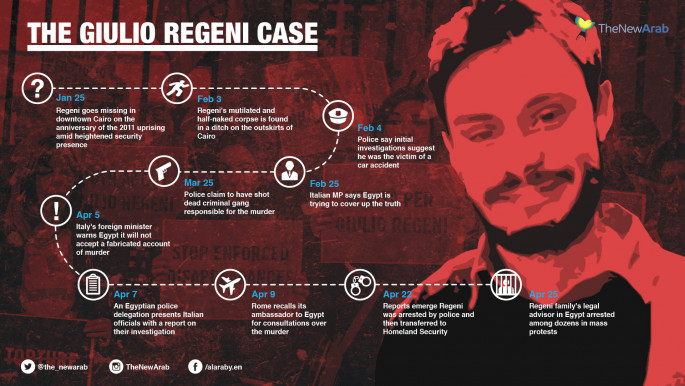Egypt police questioned as part of Regeni probe
Egypt's prosecution said on Wednesday it questioned policemen who had investigated Italian student Giulio Regeni days before his abduction, as part of a probe into his kidnapping and grisly murder.
"The Egyptian side said the investigation (into Regeni's murder) included the questioning of policemen who had investigated Giulio Regeni in early January," a joint Egyptian-Italian statement said after a two-day meeting in Rome.
"The Egyptian state prosecutor clarified that the police stopped its investigation (of Regeni) when it became clear that his activities did not threaten national security," it said.
The statement said prosecutors have also questioned policemen who killed members of a criminal gang in March and claimed to have found Regeni's belongings, including his passport, in the home of the gang leader's wife.
That account met with suspicion in Italy, where politicians and the media have suggested that Egyptian police were behind his death.
Regeni, a 28-year-old Cambridge University PhD student, disappeared on 25 January in central Cairo, as police were out in force in anticipation of protests that day.
His body was later found by the side of a road bearing signs of torture.
He had been researching street vendor trade unions, an especially sensitive political issue in Egypt, with successive governments fearing strikes and unrest.
Egypt has forcefully denied that its police were involved in his abduction.
 |
The Egyptian side said the investigation (into Regeni's murder) included the questioning of policemen who had investigated Giulio Regeni in early January. |  |
Police officials had at first suggested Regeni might have died in a road accident, and have since offered little information on their investigation.
An Italian autopsy showed that his body was covered with cuts and his bones were broken, indicating he was hit with "fists, batons and hammers".
During the meeting in Rome, the fifth between the two sides since Regeni's death, Egyptian prosecutors also handed over to Rome "all the documentation" on Regeni requested in September.
The documents included a transcript of a testimony by the head of the Cairo street vendors' independent union, who "spontaneously told police of the contacts he had with Giulio Regeni until 22 January 2016".
The Egyptians also handed over a video of a meeting with Regeni shot by the union head at the beginning of January, while Rome prosecutors handed over information collected from Regeni's Italian and British bank accounts.
Regeni's parents
On the sidelines of the Rome meeting, Regeni's parents met with prosecutor Nabil Ahmed Sadek, who headed the Egyptian delegation.
Sadek vowed not to rest "until those responsible for Regeni's murder are caught", according to Italian news agency ANSA.
Claudio and Paola Regeni said they appreciated Sadek's "gesture" and recalled their son's "deep love for the Arab world and its culture".
 |
| [Click to enlarge] |
They had recently told the Italian daily La Repubblica that they were prepared to see anyone in Egypt, including Egyptian President Abdel Fattah al-Sisi, if it could help get to the truth about their son's death.
"By now we are used to interpreting every piece of news as a possible cover-up," they said, voicing the fear that "they may be cooking up another great mise en scene, with 'well-qualified' scapegoats".
In October, Sisi said Italy was falsely blaming Egyptian security forces for the killing of Regeni because it was heeding "groundless" Egyptian media reports.
"I say to those who hold dear the interests of Egypt, don't hurt our interests," he said.
"Italy, in accusing the Egyptian security services of killing Giulio Regeni, relied on groundless information published by Egyptian media."
Regeni's killing has poisoned Egypt's close relations with Italy. In April, Rome recalled its ambassador to Cairo for consultations to protest what it said was the slow pace of the investigation and the perceived lack of cooperation.
Rights groups including Amnesty International have said Regeni was among hundreds of people who have disappeared in Egypt over the past year.
![Giulio Regeni [AFP] Giulio Regeni [AFP]](/sites/default/files/styles/image_345x195/public/media/images/DBEC4845-B143-42E5-B41E-61BBE12D1035.jpg?h=d1cb525d&itok=5mFQrv57)




 Follow the Middle East's top stories in English at The New Arab on Google News
Follow the Middle East's top stories in English at The New Arab on Google News


